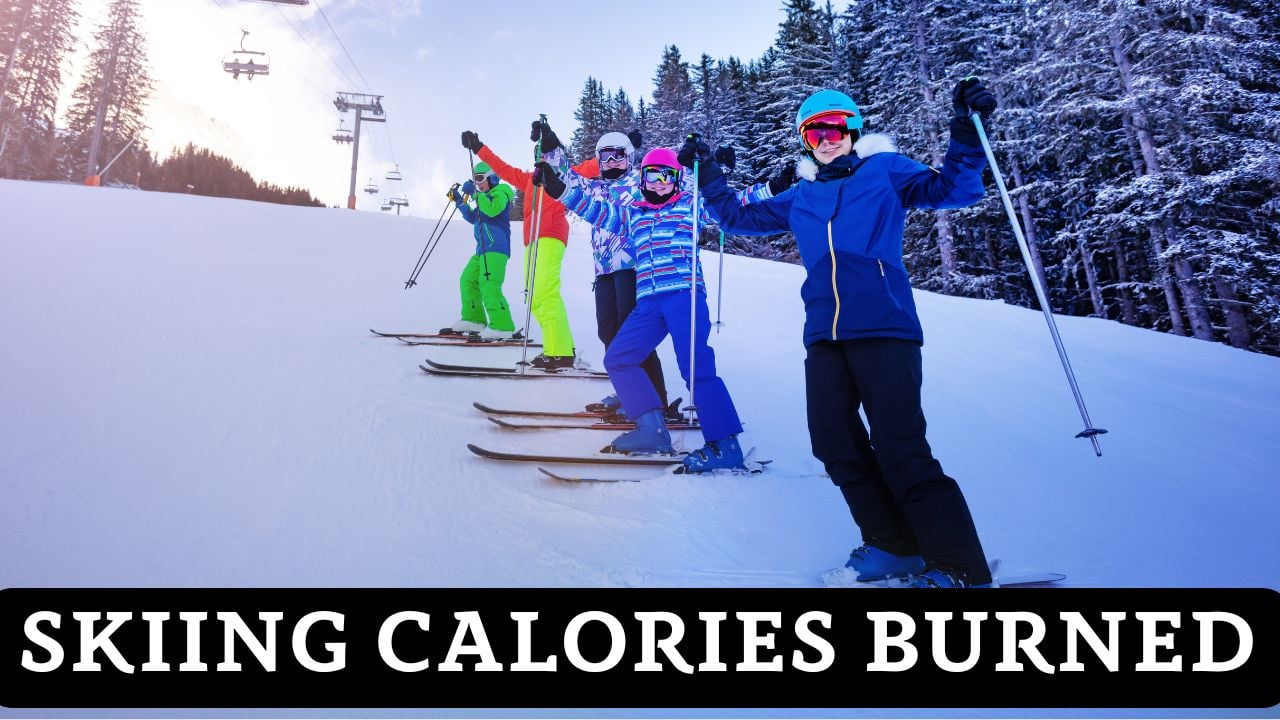⛷️ Skiing Calories Burned Calculator

How Many Calories Does Skiing Burn?
Skiing burns 300-1000 calories per hour, depending on ski type, intensity, and body weight. Cross-country skiing at vigorous intensity burns 800-1000 cal/hour, while moderate downhill skiing burns 400-500 cal/hour.
Skiing engages your entire body—legs power through turns, core stabilizes your movements, and arms work with poles. The combination of cold weather, altitude, and continuous movement significantly increases energy expenditure compared to indoor exercises.
Our calculator uses validated MET values from exercise physiology research to provide accurate estimates. Compare with our snowshoeing calculator for other winter sports options.
Science of Skiing Calorie Burn
Skiing burns calories through three main mechanisms: muscle work against gravity and terrain, cardiovascular effort from sustained activity, and thermoregulation in cold weather.
Research published in Frontiers in Physiology
shows skiing provides exceptional cardiovascular benefits while building lower body strength.
Cross-country skiing burns more calories than downhill because it requires continuous propulsion using both arms and legs. Downhill skiing, while less continuous, demands explosive power for turns and intense leg work to control speed and direction. Both styles offer excellent fitness benefits.
Our calculator uses MET values ranging from 4.3 (light downhill) to 16.0 (elite cross-country racing). These values come from the Compendium of Physical Activities. Check our MET calculator to understand metabolic equivalents across activities.
Skiing Calorie Formula & Methodology
📐 Scientific Calorie Calculation
Calories = (Time × MET × 3.5 × Weight) ÷ 200
Understanding Each Component:
- Time: Duration of skiing in minutes
- MET: Metabolic Equivalent specific to skiing type (4.3-16.0)
- 3.5: Oxygen consumption constant (ml/kg/min)
- Weight: Your body weight in kilograms
- 200: Conversion factor for kilocalories
📊 Practical Example:
Scenario: 70 kg person, 60 minutes, moderate cross-country skiing (8.5 METs)
Calculation: (60 × 8.5 × 3.5 × 70) ÷ 200 = 623 calories
Result: This person burns approximately 623 calories in one hour of moderate cross-country skiing.
Skiing Activity MET Values & Performance
| Skiing Activity | MET Value | Intensity | Calories/Hour (70kg) | Best For |
|---|---|---|---|---|
| Downhill Light | 4.3 | Light | 315 cal/hr | Beginners, leisure |
| Downhill Moderate | 6.3 | Moderate | 463 cal/hr | Recreational skiing |
| Downhill Vigorous | 8.0 | Vigorous | 588 cal/hr | Advanced terrain |
| Cross-Country Slow | 6.8 | Light-Moderate | 500 cal/hr | Endurance building |
| Cross-Country Moderate | 8.5 | Moderate | 625 cal/hr | Fitness training |
| Cross-Country Vigorous | 11.3 | Vigorous | 830 cal/hr | Performance training |
| Cross-Country Racing | 14.0 | Very Vigorous | 1029 cal/hr | Competition |
| Biathlon | 13.5 | Very Vigorous | 992 cal/hr | Elite athletes |
Note: MET values based on the Compendium of Physical Activities. Calories calculated for 70 kg (154 lb) person. Actual burn varies with terrain, snow conditions, technique, and altitude. Higher altitudes can increase calorie burn by 10-15%.
Skiing Calories by Duration
⏱️ Time-Based Calorie Estimates
Duration significantly impacts total calorie burn. These estimates use moderate cross-country skiing (8.5 METs) for reliable fitness planning. Combine skiing with our BMR calculator and TDEE calculator for complete nutrition planning.
| Time | 130 lb (59 kg) | 150 lb (68 kg) | 175 lb (79 kg) | 200 lb (91 kg) | 225 lb (102 kg) | 250 lb (113 kg) |
|---|---|---|---|---|---|---|
| 15 mins | 131 cal | 151 cal | 176 cal | 201 cal | 226 cal | 251 cal |
| 30 mins | 262 cal | 303 cal | 352 cal | 403 cal | 453 cal | 503 cal |
| 45 mins | 394 cal | 454 cal | 529 cal | 604 cal | 679 cal | 754 cal |
| 60 mins | 525 cal | 606 cal | 705 cal | 806 cal | 906 cal | 1006 cal |
| 90 mins | 787 cal | 909 cal | 1058 cal | 1208 cal | 1359 cal | 1509 cal |
| 120 mins | 1050 cal | 1212 cal | 1410 cal | 1611 cal | 1812 cal | 2012 cal |
Note: Values based on moderate cross-country skiing (8.5 METs). Downhill skiing burns 30-40% less, while vigorous cross-country burns 30-50% more. Altitude, snow conditions, and technique affect actual calorie burn.
Maximize Your Skiing Calorie Burn
💪 Techniques to Increase Calorie Burn
Choose Challenging Terrain: Steeper slopes and varied terrain increase intensity by 20-40%. Uphill sections dramatically boost calorie burn—snow mountaineering (15.5 METs) burns nearly twice as much as moderate downhill.
Try Cross-Country Skiing: Nordic skiing burns 40-60% more calories than downhill. The continuous movement engages your entire body. Build leg strength and core stability for better performance.
Maintain Continuous Movement: Minimize rest between runs. Active skiing burns significantly more than standing still. For interval training, try HIIT principles—alternate between intense runs and active recovery. Proper nutrition supports performance—use our protein calculator for muscle recovery.
Skiing Calorie Burn FAQs
❓ How accurate is this skiing calculator?
Our calculator uses the scientifically validated formula: Calories = (Time × MET × 3.5 × Weight) ÷ 200, with MET values from the Compendium of Physical Activities. This provides accuracy within 10-15%, comparable to laboratory measurements.
⛷️ Which burns more: downhill or cross-country?
Cross-country skiing burns 40-80% more calories than downhill. A 70 kg person burns approximately 625 cal/hour with moderate cross-country versus 463 cal/hour with moderate downhill. Cross-country requires continuous propulsion, engaging more muscles.
🏔️ Does altitude affect calorie burn?
Yes! Higher altitudes increase metabolic rate by 10-15% due to lower oxygen levels. Your body works harder to maintain performance, burning additional calories. Cold weather also increases energy expenditure through thermogenesis.
💪 Is skiing good for weight loss?
Absolutely! Skiing burns 300-1000 cal/hour while being easier on joints than running. Regular skiing (2-3 times weekly) combined with proper nutrition creates the calorie deficit needed for weight loss. Use our weight loss calculator for personalized goals.
⛷️ Winter Sports & Safety Disclaimer
This skiing calorie calculator provides estimates based on scientific formulas and should not replace professional coaching or medical advice. Calorie estimates are most accurate when combined with comprehensive fitness assessments. Individual results vary due to technique, terrain, snow conditions, altitude, and weather. Skiing involves inherent risks—always use proper safety equipment, ski within your ability level, and check weather conditions before heading out. Consult healthcare professionals, certified ski instructors, or sports medicine specialists before beginning intensive skiing programs, especially if you have pre-existing conditions. This tool is for educational and informational purposes only.
Related
- Weightlifting Calories Burned Calculator
- Boxing Calories Burned Calculator
- Plank Calories Burned Calculator
- Burpee Calories Burned Calculator
- Crunches Calories Burned Calculator
- Sit-Up Calories Burned
- Zumba Calories Burned Calculator
- Pull Up Calories Burned Calculator
- Push-Up Calories Burned Calculator
- Home Activities Calories Burned Calculator
- Exercise Calories Burned Calculator
- Running Calorie Calculator
- Walking Calorie Burned Calculator
References
- Conger SA, Herrmann SD, Willis EA, Nightingale TE, Sherman JR, Ainsworth BE. 2024 Wheelchair Compendium of Physical Activities: An update of activity codes and energy expenditure values. Journal of Sport and Health Science, 2024;13(1): 18-23.
- Herrmann SD, Willis EA, Ainsworth BE, Barreira TV, Hastert M, Kracht CL, Schuna Jr. JM, Cai Z, Quan M, Tudor-Locke C, Whitt-Glover MC, Jacobs DR. 2024 Adult Compendium of Physical Activities: A third update of the energy costs of human activities. Journal of Sport and Health Science, 2024;13(1): 6-12.
- Lee, W., Yoo, J., Cha, Y., Ji, H., Eun, D., Jang, H., Ju, W., Park, M., & Jee, S. (2019). Effects of winter skiing on stress, heart rate, apprehension, and enjoyment in collegiate students: A single randomized controlled trial. Journal of Exercise Rehabilitation, 15(2), 235. https://doi.org/10.12965/jer.1938116.058
- Kubas, Maria & Krzemińska, Katarzyna & Czerwik, Julia & Kuszneruk, Julia & Kłusek, Magdalena & Chawrylak, Katarzyna & Kubas, Wojciech & Sadok, Aleksandra. (2024). The health aspects of skiing. Quality in Sport. 23. 54686. 10.12775/QS.2024.23.54686.
- Burtscher, Martin & Federolf, Peter & Nachbauer, Werner & Kopp, Martin. (2019). Potential Health Benefits From Downhill Skiing. Frontiers in Physiology. 9. 10.3389/fphys.2018.01924.

Manish is a NASM-certified fitness and nutrition coach with over 10 years of experience in weight lifting and fat loss fitness coaching. He specializes in gym-based training and has a lot of knowledge about exercise, lifting technique, biomechanics, and more.
Through “Fit Life Regime,” he generously shares the insights he’s gained over a decade in the field. His goal is to equip others with the knowledge to start their own fitness journey.
